| Srl | Item |
| 1 |
ID:
123104
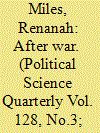

|
|
|
|
|
| Publication |
2013.
|
| Summary/Abstract |
RENANAH MILES examines recent stabilization and reconstruction missions in Afghanistan and Iraq. She analyzes persistent shortfalls in the ability of the State Department and the U.S. Agency for International Development to conduct these missions. She contends that organizational culture and bureaucratic turf wars undermine civilian leadership and encourage the military to compensate in its absence.
|
|
|
|
|
|
|
|
|
|
|
|
|
|
|
|
| 2 |
ID:
118638
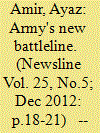

|
|
|
| 3 |
ID:
053776
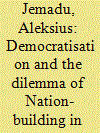

|
|
|
|
|
| Publication |
Oct 2004.
|
| Summary/Abstract |
Since the fall of Suharto's autocratic regime in May 1998, Indonesia has gone through a delicate process of democratisation. At the same time Indonesia is also confronted with the problem of nation-building. The question is: how can a democratic Indonesia unite itself? By using the theoretical relationship between the issue of democratisation and national identity, the paper tries to show the dilemma of nation-building in the post-Suharto Indonesia, especially with regard to the resolving of conflict in Aceh. On the one hand, the Indonesian leaders are required to show their commitment to democratic principles in ending the conflict and, on the other hand, they cannot rule out the possibility of using military means in keeping the nation united. An effective control by the civilian leaders over the military is essential for the peaceful solution of Aceh conflict.
|
|
|
|
|
|
|
|
|
|
|
|
|
|
|
|
| 4 |
ID:
126290
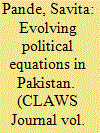

|
|
|
| 5 |
ID:
154239
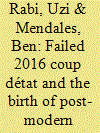

|
|
|
| 6 |
ID:
111008
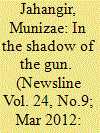

|
|
|
| 7 |
ID:
123682


|
|
|
| 8 |
ID:
126080
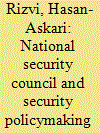

|
|
|
| 9 |
ID:
140401
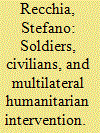

|
|
|
|
|
| Summary/Abstract |
Approval from the United Nations or NATO appears to have become a necessary condition for US humanitarian military intervention. Conventional explanations emphasizing the pull of legitimacy cannot fully account for this given that US policymakers vary considerably in their attachment to multilateralism. This article argues that America's military leaders, who are consistently skeptical about humanitarian intervention and tend to emphasize its costs, play a central role in making multilateral approval necessary. As long as top-ranking generals express strong reservations about intervention and no clear threat to US national security exists, they can veto the use of force. In such circumstances, even heavyweight “humanitarian hawks” among the civilian leadership, who initially may have wanted to bypass multilateral bodies to maximize US freedom of action, can be expected to recognize the need for UN or NATO approval—if only as a means of mollifying the generals by reassuring them about the prospect of sustained multilateral burden sharing. Two case studies drawing on interviews with senior civilian and military officials illustrate and probe the plausibility of the argument.
|
|
|
|
|
|
|
|
|
|
|
|
|
|
|
|
| 10 |
ID:
122863
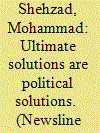

|
|
|
| 11 |
ID:
123103
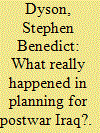

|
|
|
|
|
| Publication |
2013.
|
| Summary/Abstract |
STEPHEN BENEDICT DYSON challenges the argument that the U.S. government failed to conduct planning for the post-Saddam Iraq. He shows that a plan for governing the country jointly with Iraqi leaders was developed and endorsed by the George W. Bush administration. Yet this plan was not implemented as a result of the on-the-ground decisions of Ambassador L. Paul Bremer, who formalized an occupation and began an extended period of direct rule.
|
|
|
|
|
|
|
|
|
|
|
|
|
|
|
|